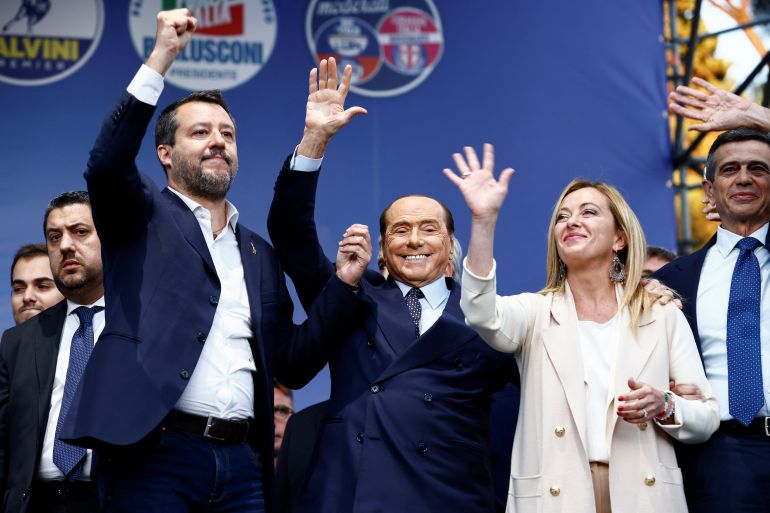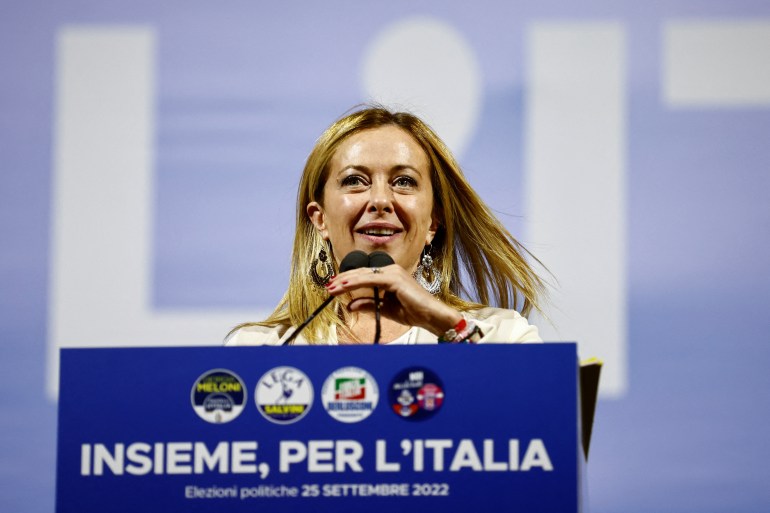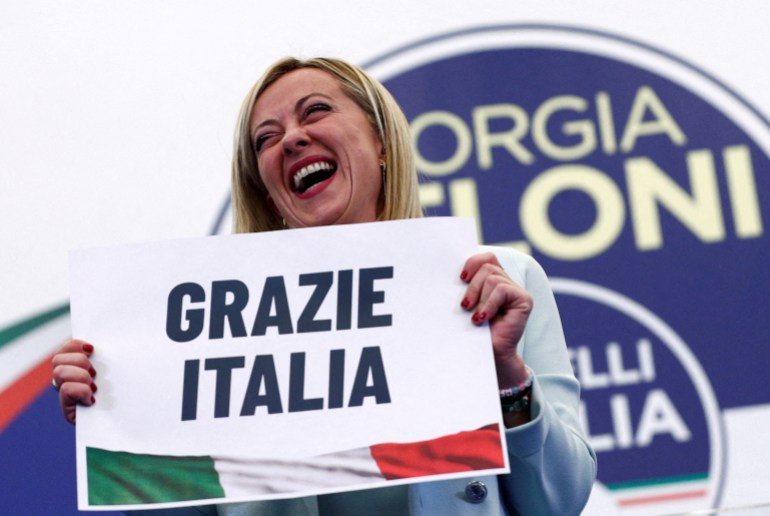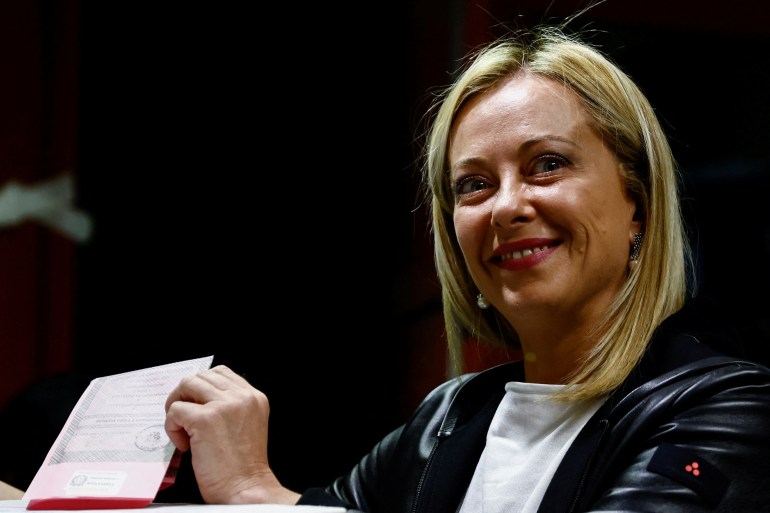Is Italy returning to its Fascist past?
Italy is on the verge of electing Europe’s most far-right government since World War II.

Italy, the country that first coined the term “fascismo” more than a century ago, is poised on Sunday to elect a prime minister whose party descended from fascism. The failure of Italy’s current governing party to maintain a coalition has left Giorgia Meloni and her far-right Brothers of Italy party in the lead. Why would Italy choose to return to its fascist past?
Keep reading
list of 4 itemsWhat’s ailing Bollywood’s string of flops?
Why Europe’s energy prices are spiraling out of control
Climate Change: Leaving Pakistan out to dry
In this episode:
- Michele Barbero (@MicheleBarbero), AFPTV Live deputy editor-in-chief and writer for Foreign Policy
- Barbara Serra (@BarbaraGSerra), Italian-born journalist and producer of Fascism in the Family: Al Jazeera Correspondent
Connect with us:
@AJEPodcasts on Twitter, Instagram, and Facebook
Full episode transcript:
This transcript was created using AI. It’s been reviewed by humans, but it might contain errors. Please let us know if you have any corrections or questions. Our email is TheTake@aljazeera.net.
[THEME MUSIC PLAYING]
Giorgia Meloni: I am Giorgia Meloni. I am 45 years old and I am the president of Fratelli d’Italia, the political party of Italian conservatives.
Halla Mohieddeen: That’s the woman whose party is slated to win Italy’s election this Sunday.
Michele Barbero: There is a lot of concern and justified concern about Meloni’s rise due to the fact that Italy is the place where fascism was born.
Halla Mohieddeen: Meloni’s party grew out of the fascist movement started a century ago by Benito Mussolini.
Halla Mohieddeen: Now, it’s part of a coalition with Matteo Salvini’s anti-immigrant league party and Italy’s former prime minister, Silvio Berlusconi.
Michele Barbero: If Meloni, Salvini and Berlusconi win the next elections, this will be by far the most hard-right government that any country in western Europe has seen since World War II.
Halla Mohieddeen: Why would Italians want to vote in a party associated with fascism again?
I’m Halla Mohieddeen and this is The Take.
[THEME MUSIC PLAYING]
Halla Mohieddeen: Michele Barbero is an Italian journalist.
Michele Barbero: I’m a senior producer at AFP news agency. And I’m a contributor for various magazines, especially Foreign Policy.
Halla Mohieddeen: So as a political journalist, you’re just the guy we need to talk to then. There are elections in Italy at the weekend. Is it possible that Italy will elect a neo-fascist government on Sunday?
Michele Barbero: It depends on your definition of neo-fascist. What’s certainly not only possible, but quite likely is that Giorgia Meloni, the leader of the Brothers of Italy, will win big indeed.

[MUSIC PLAYING]
Halla Mohieddeen: So, tell us about Giorgia Meloni, and the Brothers of Italy. Why are they referred to as neo-fascist? Meloni herself was interviewed by the Washington Post, and she called herself conservative.
Michele Barbero: Yeah, she would not agree with the definition of neo-fascist, most likely. But it’s a fact that her party, the Movimento Sociale Italiano, was created right after World War II by regime officials. She is definitely a nationalist, hard-right, socially conservative politician. Her relationship with fascism is at the very least ambiguous.
Halla Mohieddeen: But, she has spoken about Benito Mussolini, Italy’s fascist dictator, yes?
Michele Barbero: She was being interviewed when she was 19, a very young militant. And indeed, she said something along the lines of, you know, Mussolini was a good politician.
Giorgia Meloni: C’etait un bon politician.
Michele Barbero: And now, she published a video in multiple languages, stressing that she disavows fascist dictatorship.
Giorgia Meloni: I have been reading that the win of Fratelli d’Italia in the September elections would mean a disaster leading to an authoritarian turn – Italy’s departure from the euro and other nonsense of this sort. None of this is true.
Michele Barbero: But when it comes to her underlying ideology, in fact she is fairly in line with what fascism was all about, a strong nationalist ideology, with a certain wariness of differences to put it mildly. Italy did become for a little bit an empire, where all that matters is the strength and the power of the nation, where everybody’s marching together to achieve that goal.
Newsreel: This is Italy in 1920. These marching men are charter members of a new Italian political party, the fascists, founded and led by a flamboyant ex-editor, ex-army corporal, ex-socialist Benito Mussolini.
Michele Barbero: And where differences of, political views, sexual orientation, and so forth are seen as a weakness as “deviance” – to use a word that Meloni has actually used quite recently.
Halla Mohieddeen: Fascism is remembered by many as the worst period in Italian history.
[MUSIC PLAYING]
Halla Mohieddeen: So why are so many Italians prepared to vote for its legacy? To answer those questions we turned to Barbara Serra.
Barbara Serra: I’m an Italian-born journalist. And I made a film for Al Jazeera called Fascism in the Family.
Halla Mohieddeen: And you discovered that your grandfather was a pretty important part of Mussolini’s fascist movement in Italy.
Barbara Serra: Yeah, so, I called it, Fascism in the Family, rather than my family, because I think, you know, it’s my family, but really it’s Italy. If I tell an Italian, my grandfather was a fascist, one out of three Italians will say, well, so was mine. In 20 years there were a lot of people that were part of the fascist party. Not all, maybe as committed as my grandfather was, but you know, it was a huge part of life, for two decades.
Halla Mohieddeen: The fact that Barbara’s grandfather was a fascist wasn’t a surprise. His ties to Nazi Germany were.
Barbara Serra: So, I always knew that he’d been a fascist. He was the mayor of a mining town in Sardinia, but I sort of got the idea to make the film, because I did find a letter from the Nazis among, you know, old family pictures.
Fascism in the Family: While looking through the pictures I found this…
[SERRA’S VOICE CONTINUES UNDER]
Barbara Serra: Which was, you know, a bit of a gut punch…
Halla Mohieddeen: That must have been a shock, no?
Barbara Serra: That I have to say that was.
Fascism in the Family: Berlin, the date 16 of May, 1938 so that’s just a few months before Italy passes, racial laws…
Barbara Serra: …and look, you know, I’m quite weathered in the sense that I’ve been a journalist for a long time, but yeah, finding Nazi letter among old family pictures was not one of the highlights of that particular year. I sort of looked into, you know, the history of that letter and what it was like, and then how it could start today.

[MUSIC PLAYING]
Halla Mohieddeen: Just remind us, how did it start?
Barbara Serra: Effectively, Mussolini starts right after World War I, obsessed with empire and expanding. So you have that gradual crescendo to total power in 1925 which is, you know, arguably a full 10 years before Hitler takes power in Germany. Anti-Semitism wasn’t a core part of fascism until it allied itself with Germany and passed its own racial laws.
Halla Mohieddeen: Those laws stripped Jewish Italians of their jobs and rights. And this is where, Barbara says, many Italians see a distinction in Mussolini’s rule: there’s fascist Italy before the racial laws were enacted, and then there’s fascist Italy afterwards.
Barbara Serra: Because almost all Italians that I’ve spoken to that are sympathetic, let’s say to Meloni and her ilk -even the people that I’ve interviewed, literally paying their respects at Mussolini’s tomb – all of them will say: the racial laws were bad, the alliance with Hitler was bad, but before that fascism was fine. Because they separate what it became with the racial laws and then eventually when Germany invaded with the deportation of Italian Jews to the concentration camps, to what it was before.
Halla Mohieddeen: Of course, Mussolini’s Italy and Hitler’s Germany lost World War II. But the way it ended for Italy was different, Barbara says.
Barbara Serra: And so at the end of the war, there was a huge desire for national unity and national stability. So what was done in Nazi Germany, ie, purging the whole of government of any Nazi wasn’t done, nowhere near to the same extent in Italy. And that is why you had some parties emerge right after World War II that were filled with members that had served under Mussolini.
Halla Mohieddeen: The largest being the Movimento Sociale Italiano which Giorgia Meloni became a member of when she was just 15. That was in 1992.
Halla Mohieddeen: So there was no national reckoning in Italy. In Germany still to this day, it’s a cross that they bear and they make a constant effort to understand their past and distance themselves from it. That reckoning hasn’t happened in Italy at all?
Barbara Serra: Listen, listen, there’s a lot of people that have done that right. So, I mean, I think we shouldn’t overstate the kind of support that Meloni has. And I also think we should remember that a lot of people support Meloni that aren’t necessarily apologists for fascists or certainly not Holocaust deniers. But yes, that reckoning that happened in Germany didn’t happen for a variety of historical reasons in Italy. And I think we are still kind of seeing the impact of that now.
Halla Mohieddeen: So how closely linked is Mussolini’s fascist party to Georgia Meloni’s Brothers of Italy? And what about their policies? That’s after the break.
Halla Mohieddeen: I asked Michele to help us trace Italy’s political trajectory since the end of Mussolini.
Halla Mohieddeen: Can you just explain the evolution from the fascist movement of the past, to the current-day Brothers of Italy? I mean, are there still Mussolini supporters in that party?
Michele Barbero: So, the short answer is yes, for sure. After World War II, there was one openly, post-fascist neo-fascist party in the sense that it was founded by people who had belonged to the Mussolini regime, which was called Movimento Sociale Italiano. This party then evolved into a somewhat more mainstream party, Alliance Nationale, National Alliance in the 90s. Which actually disavowed, at least in theory, fascist regime, and then formed a united party with Berlusconi’s conservatives. So the fascist identity was somewhat watered down.
Halla Mohieddeen: But that watered-down version wasn’t working for Giorgia Meloni, Michele says.
Michele Barbero: What’s interesting is that Meloni and a few others, in 2012, they split from this more mainstream party, effectively recreating a more hard-right party that is clearly the heir of the old Movimento Sociale Italiano. Even the symbols, the party logo still features the tri-colour flame, which was the very identifiable symbol of the Movimento Sociale Italiano.
Halla Mohieddeen: Michele’s careful to note the Italian people are not only wrestling with their past – there’s also the present to contend with.
Halla Mohieddeen: Can you just give us a sense of what the political environment is and why that is appealing to some people?
Michele Barbero: Well, first of all, what her policies are, is not the same as what people are signing up for. People are just not trusting old, traditional, mainstream social democratic parties anymore.

[MUSIC PLAYING]
Michele Barbero: Italy is a country that has very strong anti-political anti-establishment feelings. We’ve had three different governments since 2018, very different coalitions during extremely rocky times, COVID, the war in Ukraine now, a massive inflation and energy crisis. So, the fact that Meloni consistently managed to portray herself as somebody who never dirtied her hands with time spent in government, unlike most other parties, is a real asset.
Halla Mohieddeen: The government immediately preceding this election was headed by Mario Draghi – former head of the European Central Bank. Many Italians are grateful to him for getting the country billions of dollars in COVID recovery funds.
Newsreel: Italy’s been promised $200bn in EU grants and loans – the largest chunk of the entire bloc’s $900bn recovery fund.
Halla Mohieddeen: Then, in July, he resigned, which left some onlookers a bit confused.
Mario Draghi: Even central bankers’ hearts are touched sometimes. Thank you for this and thanks for all the work we have done together during this time.
Halla Mohieddeen: Forgive me if I’m wrong here, Michele, but I got the impression during COVID, when you had Mario Draghi, people seemed relatively happy with that government, is that right?
Michele Barbero: I think that’s correct. Draghi is very much an internationally recognised leader, somebody that almost everyone really in Italy considers certainly competent. But essentially what happened is this very broad coalition that backed Draghi fell apart. The incentives to, to mark the differences and to bicker with one another became too strong. Drahgi was fed up. He didn’t want to stay in power anymore, rumour has it. And so, we find ourselves in a new electoral campaign.
Halla Mohieddeen: It just seems constant. You’ve got new governments being formed and then collapsing and she would also be Italy’s first female prime minister, Giorgia Meloni. Is that something that people are taking note of?
Michele Barbero: I would say the fact is balanced out, by worries that she might actually not be that great at all for women’s rights.
Halla Mohieddeen: Talk to me about her policies, because she’s not storming in by way of coup d’état. She’s asking people to vote for her and her party. And from what you say, it sounds like large parts of Italian society are prepared to do that. What are people signing up for?
Michele Barbero: Meloni’s Brothers of Italy is hard on immigration. She’s talked about possible blockades to be set up off the northern coast of Africa. The vague idea that Italy has to be respected abroad. We need a strong Italy, what exactly that means remains to be seen. There are fears on the left that in the long term, a Meloni government might actually lead to some kind of democratic backsliding. Then when it comes to social policies, she’s very conservative. Tough on LGBT rights. There are certainly fears that she will take steps to curtail abortion rights, making medical equipment and drugs harder to get and less available – as is already the case in the Marche region, currently under control of Brothers of Italy.
Halla Mohieddeen: It’s very much traditional family units, and that kind of thing.
[MUSIC PLAYING “IO SONO GIORGIA”]
Halla Mohieddeen: In October 2019, what first appeared on the internet as one of her traditional campaign speeches quickly morphed into this very untraditional techno remix that went viral. It seems to mock her message while alerting Italians about what she has in store. I am Giorgia. I’m a woman. I’m a mother. I’m a Christian! Meloni shouts. The dance beat continues and weaves in some of her greatest hits from the campaign…

[MUSIC PLAYING]
Halla Mohieddeen: …taking issue with LGBTQ rights.
Halla Mohieddeen: In other speeches she’s described Islam as violent. And then there is the question about the war that continues to rage in Ukraine. That may even be getting worse.
Halla Mohieddeen: What about Russia?
Michele Barbero: So this is, I would say, perhaps the biggest rift within the right-wing alliance right now. Meloni, probably because she’s tipped to become Italy’s next prime minister, she’s been quite careful to stress that she is absolutely in favour of the current Italian stance on Russia.
Halla Mohieddeen: Michele says there are other Italian politicians whose ties to Russia are more worrying – like Matteo Salvini with the anti-immigrant League Party and former Italian Prime Minister Silvio Berlusconi.
Michele Barbero: Salvini has historically had much stronger ties with Putin, and Russia in general. He keeps at least questioning to what extent the sanctions are useful or not.
Halla Mohieddeen: So if she is set to win, according to all the opinion polls, would you say that her voice and her party represents most of Italy?
Michele Barbero: I mean, she will definitely have the legitimacy to lead and to rule the country. She does not represent the entire, not even probably the majority of Italian population. On the issues, a majority of Italians may actually be in favour of abortion rights. There are strong anti-immigration sentiments in the country. Still, a majority of Italians are in favour of relaxing the rules to give Italian citizenship to the children of immigrants. To put it simply, the main issue is that the right managed to form a coalition and to run together, whereas the left didn’t.
Halla Mohieddeen: Do you think Italians believe Georgia Meloni when she presents this image, you know, we’re not fascist, we’re just conservative, distancing herself from previous statements that she’d made?
Michele Barbero: So I think, essentially she’s grown up. She’s understood that she’s not a 19-year-old militant anymore. She can’t openly say that Mussolini was a good politician. I would say that many Italians essentially don’t care, especially the younger generations. Most Italians, just like 100 years ago, the vague idea of a strong, powerful nation that’s respected in the world is something that actually resonates. This is the key to understand Meloni’s popularity right now.
[MUSIC PLAYING]
Halla Mohieddeen: And from trying to understand her country and her grandfather, Barbara says she understands that popularity, too.
Barbara Serra: The whole time you know, when I was looking at the decisions that my grandfather ended up making through the years, I never thought, oh, I would never do that. I think we forget how seductive dictatorships can be. Dictators always present you with easy solutions, and there’s a seduction there to a lot of these leaders and it’s not just Italy, you know, look around.
Halla Mohieddeen: It has been said that fascism is a slippery slope and Barbara also recognises that reality.
Barbara Serra: I think we have to be careful. I mean, I think there are things to be concerned about. I don’t necessarily think we’re gonna see troops in black shirts marching down Rome the day after the election. The thing we need to be careful about is this idea that some people are real Italians and some people aren’t. Right? And then it just depends what the sort of fashion of the day is as to who is and who isn’t. Using of people as scapegoats – I think that is one thing that was used back then, that is being used now. And that, I think, we always have to be wary of – also because you never know when whatever group you are in might be tomorrow’s scapegoat. Right? It’s that old line, one day they’ll come for you.

Halla Mohieddeen: So I asked Michele – what happens on Monday – if Giorgia Meloni does win?
Michele Barbero: When it comes to Italy, I think, we will see for a few months or years a general atmosphere that will not be particularly positive or good for any kind of minority, based on sexual orientation, or immigrants. I don’t believe that we will see an immediate crisis of Italian liberal democracy. Even the people who define themselves as neo-fascist, they’re not neo-fascist in the sense that they wish there was just one party, no freedom of the press.
Halla Mohieddeen: He also says he’s not sure Giorgia Meloni’s party is here to stay.
Michele Barbero: I’m not convinced that Berlusconi and Salvini will be particularly happy with Meloni leading this government for a bunch of different reasons, sexism being one of them. I think there is a strong chance of this coalition bickering over substantial and less substantial reasons.
Halla Mohieddeen: It might not be that stable a coalition after all.
Michele Barbero: Absolutely, absolutely.
Halla Mohieddeen: And that’s The Take
This episode was produced by Amy Walters with Ashish Malhotra, Ruby Zaman, Alexandra Locke, Negin Owliaei, Chloe K. Li and me, Halla Mohieddeen.
Our sound designer is Alex Roldan. Aya Almileik and Adam Abou-Gad are our engagement producers. And Ney Alvarez is our head of audio.
We’ll be back on Monday.
Episode credits:
This episode was produced by Amy Walters and Ashish Malhotra with our host, Halla Mohieddeen. Ruby Zaman fact-checked this episode. Our production team includes Chloe K Li, Alexandra Locke, Ashish Malhotra, Negin Owliaei, Amy Walters, and Ruby Zaman. Our sound designer is Alex Roldan. Aya Elmileik and Adam Abou-Gad are our engagement producers. Ney Alvarez is Al Jazeera’s head of audio.